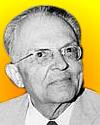 (source)
(source)
|
Rudolf Carnap
(18 May 1891 - 14 Sep 1970)
German-American philosopher who was a member of the Vienna school of logical positivists in the 1920s.
|
Science Quotes by Rudolf Carnap (11 quotes)
If a certain regularity is observed at all times and all places, without exception, then the regularity is expressed in the form of a “universal law”.
— Rudolf Carnap
In An Introduction to the Philosophy of Science (1966, 1995), 3.
In the application of inductive logic to a given knowledge situation, the total evidence available must be used as a basis for determining the degree of confirmation.
— Rudolf Carnap
In Logical Foundations of Probability (1950, 1962), 211.
Let us be cautious in making assertions and critical in examining them, but tolerant in permitting linguistic forms.
[Carnap’s famous plea for tolerance to which W.V. Quine took exception.]
[Carnap’s famous plea for tolerance to which W.V. Quine took exception.]
— Rudolf Carnap
Concluding sentence in article, 'Empiricism, Semantics, and Ontology,' Revue International de Philosophie (1950), 11. Article reprinted in Richard Boyd, Philip Gasper and J.D. Trout (editors)The Philosophy of Science (1950), 96.
Logic is not concerned with human behavior in the same sense that physiology, psychology, and social sciences are concerned with it. These sciences formulate laws or universal statements which have as their subject matter human activities as processes in time. Logic, on the contrary, is concerned with relations between factual sentences (or thoughts). If logic ever discusses the truth of factual sentences it does so only conditionally, somewhat as follows: if such-and-such a sentence is true, then such-and-such another sentence is true. Logic itself does not decide whether the first sentence is true, but surrenders that question to one or the other of the empirical sciences.
— Rudolf Carnap
Logic (1937). In The Language of Wisdom and Folly: Background Readings in Semantics (1967), 44.
Logic is the last scientific ingredient of Philosophy; its extraction leaves behind only a confusion of non-scientific, pseudo problems.
— Rudolf Carnap
The Unity of Science, trans. Max Black (1934), 22.
One of the great distinguishing features of modern science, as compared to the science of earlier periods, is its emphasis on what is called the “experimental method”. … In the experimental way, we take an active role. Instead of being onlookers, we do something that will produce better observational results than those we find by merely looking at nature. Instead of waiting until nature provides situations for us to observe, we try to create such situations. In brief, we make experiments.
— Rudolf Carnap
In An Introduction to the Philosophy of Science (1966, 1995), 40.
Science is a system of statements based on direct experience, and controlled by experimental verification. Verification in science is not, however, of single statements but of the entire system or a sub-system of such statements.
— Rudolf Carnap
The Unity of Science (1934), trans. Max Black, 42.
The laws of logic and pure mathematics, by their very nature, cannot be used as a basis for a scientific explanation because they tell us nothing that distinguishes the actual world from some other possible world. When we ask for the explanation of a fact, a particular observation in the actual world, we must use of empirical laws. They do not possess the certainty of logical and mathematical laws, but they do tell us something about the structure of the world.
— Rudolf Carnap
In An Introduction to the Philosophy of Science (1966, 1995), 11-12.
The observations we make in everyday life as well as the more systematic observations of science reveal certain repetitions or regularities in the world. Day always follows night; the seasons repeat themselves in the same order; fire always feels hot; objects fall when we drop them; and so on. The laws of science are nothing more than statements expressing these regularities as precisely as possible.
— Rudolf Carnap
In An Introduction to the Philosophy of Science (1966, 1995), 3.
The self is the class (not the collection) of the experiences (or autopsychological states). The self does not belong to the expression of the basic experience, but is constructed only on a very high level.
— Rudolf Carnap
The Logical Structure of the World, trans. by Rolf A. George (1967), 299.
When we say that scientific knowledge is unlimited, we mean that there is no question whose answer is in principle unattainable by science.
— Rudolf Carnap
The Logical Structure of the World, trans. R. George (1967), 290. In Vinoth Ramachandra, Subverting Global Myths: Theology and the Public Issues Shaping our World (2008), 171.
See also:
- 18 May - short biography, births, deaths and events on date of Carnap's birth.
 In science it often happens that scientists say, 'You know that's a really good argument; my position is mistaken,' and then they would actually change their minds and you never hear that old view from them again. They really do it. It doesn't happen as often as it should, because scientists are human and change is sometimes painful. But it happens every day. I cannot recall the last time something like that happened in politics or religion.
(1987) --
In science it often happens that scientists say, 'You know that's a really good argument; my position is mistaken,' and then they would actually change their minds and you never hear that old view from them again. They really do it. It doesn't happen as often as it should, because scientists are human and change is sometimes painful. But it happens every day. I cannot recall the last time something like that happened in politics or religion.
(1987) -- 


